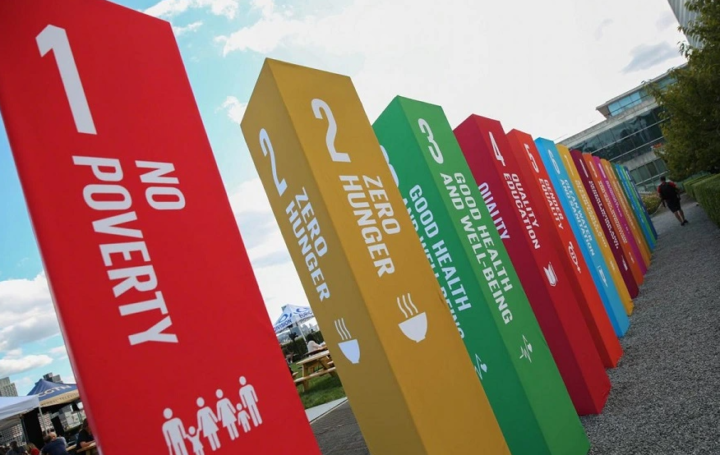BY CHIBUIKEM DIALA
A few days ago, the honourable minister for environment announced the ban on single-use plastics in all federal ministries, departments, and agencies (MDAs).
This commendable ban is a positive step in the right direction, especially as the race towards net-zero speeds up.
This is no doubt a major policy direction that will constantly remind Nigerians, especially policymakers, of the need for innovation, sustainable investments, responsible consumption, environmental protection, and crucial efforts to reduce CO2 emissions.
Advertisement
In the words of the minister for environment, “this initiative demonstrates our commitment to addressing the triple threat of climate change, biodiversity loss, and pollution”.
This is a wake-up call inspiring innovation across all sectors of Nigeria’s economy, especially in the hospitality and tourism industry, to begin to find credible alternatives to single-use plastics, including PET bottles, straws, disposable take-away packs, beverage containers, disposable cutlery, disposable plastic cups, cotton buds (plastic stick), and bags that are designed to be used only once.
According to the Global Plastic Action Partnership of the World Economic Forum (WEF), Nigeria has about “2.5 million tonnes of plastic waste annually, ranking ninth globally among countries with the highest contributions to plastic pollution.” It further states that over 88% of the plastic waste generated in Nigeria is not recycled. Instead, much of it ends up in water bodies – rivers, lakes, drains, lagoons, and the ocean.
Advertisement
Also, the World Economic Forum in its publication, “The New Plastics Economy: Rethinking the Future of Plastics,” says that: “if current trends continue, plastic production is expected to account for 20% of global oil consumption by 2050.”
These statistics provide considerable justification for policies that help in the reduction of single plastic usage in Nigeria.
Hence, today’s (25/06/24) ban on single-use plastics by the Nigerian government marks a significant step toward addressing pressing environmental issues caused by plastic waste, such as bags, straws, and bottles, which have long contributed to pollution in Nigeria’s cities, waterways, and countryside.
By implementing this ban starting with federal MDAs, Nigeria aims to reduce the harmful impact of plastic on its environment, protect wildlife, and improve public health. I also think this is in fulfilment of Nigeria’s commitment at the last Conference of Parties in Dubai.
Advertisement
This bold move aligns with global trends, as many countries are taking similar actions to combat the growing plastic pollution crisis. Countries like Chile, France, the European Union, Kenya, Rwanda, Australia, India, Canada, and the United Kingdom, among others, have instituted one form of ban or restriction on single-use plastics to combat plastic pollution.
This development also syncs with the recently concluded International Hospitality Tourism and Eco-Sustainability Forum with the theme ‘Emerge Together: Reimagining A Green Hospitality Economy’ in which experts including Nigeria’s minister for tourism, representative of federal ministry of environment, Hospitality and Sustainability professionals, shared ideas on how to integrate ‘Circular Hospitality’ into the industry in Nigeria.
Pot of gold (opportunities)
The ban on single-use plastics is not just an environmental measure; it also opens doors for economic opportunities. It will push-start research and development of alternative eco-products.
Advertisement
1. Transitioning away from single-use plastics necessitates the development of sustainable alternatives, which can spur innovation and create new industries. Local entrepreneurs and businesses have the chance to explore eco-friendly products, such as biodegradable packaging and reusable containers, fostering a green economy. This shift can generate jobs, boost local manufacturing, and reduce Nigeria’s dependency on imported plastics, enhancing economic resilience.
2. Moreover, the single-use plastic ban sets the stage for Nigeria to embrace a circular economy. In a circular economy, products and materials are kept in use for as long as possible, extracting maximum value before recovery and regeneration at the end of their service life. This approach contrasts with the traditional linear economy of “take, make, dispose.” By reducing single-use plastic waste and encouraging recycling and reuse, Nigeria can minimise environmental degradation and promote sustainable development. This ban is a pivotal first step towards a circular Nigeria, where economic growth and environmental stewardship go hand in hand.
Advertisement
Challenges
But what does this mean for the country’s economy and everyday life?
Advertisement
1. The ban on single-use plastics comes with possible challenges. Nigeria’s economy is heavily reliant on plastic manufacturing and distribution. Thousands of jobs are at stake, and the cost of alternatives could be prohibitive for many businesses and consumers. To ensure a smooth transition, the government needs to invest in the development of affordable and accessible alternatives.
2. Has the federal government through the ministry of environment done any form of inter-MDA advocacy? Public awareness campaigns are essential to educate citizens on the importance of the ban and how they can adapt.
Advertisement
3. Ease of implementation is also another major challenge. Will this policy be implemented fully in the federal MDAs? What level of compliance is expected and what monitoring and evaluation barometers are in place?
These burning questions deserve answers.
While we await more details from the minister on the specific single-use plastics banned, the success of this initiative will depend on the collaboration between the government, private sector, and citizens. With the right policies and support, Nigeria can turn this environmental challenge into an opportunity for a more sustainable and prosperous future.
Engr. Chibuikem Diala MIH is the CEO of Sustainable Eco6tems. He is also the executive director of the International Hospitality Tourism and Eco-Sustainability Forum (IHTEF), a hospitality and tourism project that is championing ‘circular hospitality’ initiatives in Africa. He can be reached via [email protected]
Views expressed by contributors are strictly personal and not of TheCable.
Add a comment






